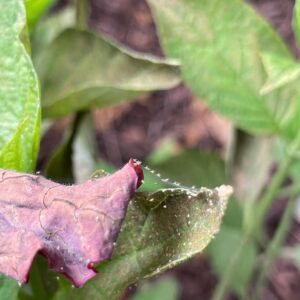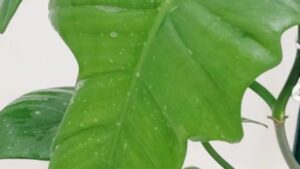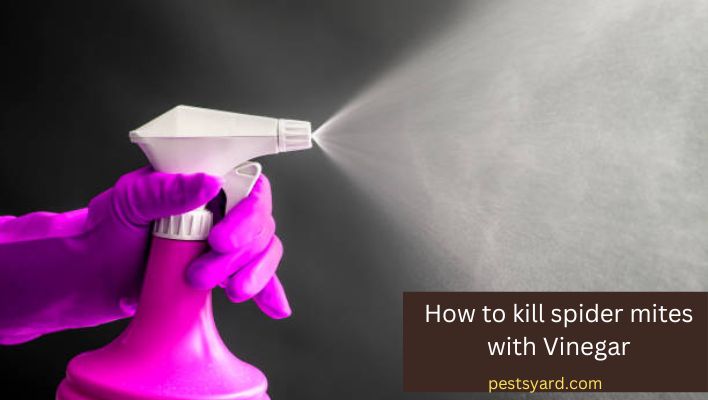You’ve probably seen those little red specks with webs on your plants. They look like tiny bloodsuckers and can be a real pain for any gardener to get rid of; they are mites and multiply quickly. Vinegar has been used for thousands of years to clean and kill insects and fungi on plants;
However, you may be wondering, does vinegar kill spider mites on plants, or how does it kill mites to ensure it is truly effective? In technical terms, vinegar will kill all types sap sucking mites, but you have to be careful with its application to avoid damaging your plants.
Many people use vinegar to control mites, flies, ants, and other pests. But is vinegar the best way to get rid of these little bugs?
Vinegar has been used for centuries as a natural household remedy. In addition, it is also an effective organic fungicide, disinfectant, and cleaner. The high acidity of your standard white vinegar helps control many plant problems, including mites on plants, as long as you follow the directions.
Vinegar contains acetic acid, used to kill weeds when applied directly, and will do the same when misused on your plants.
For this reason, it is important to use other methods to eliminate mites without worrying about damaging your plants. This is why it is important to know how to use vinegar to treat pests on your plants. Below we dive into everything you need to know about vinegar and how to use it correctly for your plants.
- All natural
- Special cleaning strength
- Safe for cooking
Vinegar kills spider mites.
Vinegar is a good way to treat spider mites. It can be used in indoor and outdoor environments, depending on the location of your infestation. Vinegar is acidic, which will help break down the surface tension on spider mites’ sticky webs, kill their eggs, and dehydrate them.
This will cause them to fall off their webs and die. Using vinegar as a spray can kill as many spiders and pests as possible. The good news is that vinegar is non-toxic, so there’s no need to worry about hurting yourself or your pets when using it.
In order for vinegar to be effective, you will need to dilute it with water. You can use apple cider or white vinegar; ensure to check the label of whatever you use, as some vinegar are more acidic than others.
You can do this by mixing vinegar and water; you can add dish soap or baking soda to make it more effective. First, pour some water into a spray bottle. Then add three tablespoons of white vinegar to the bottle, and shake it up so that all the water has been mixed with the vinegar.
Spray this mixture onto your plants, then allow them to sit for several hours before watering again. Spider mites will die within 24 hours. If you want to use it indoors, mix vinegar with water and spray on leaves or flowers where you see spider mites without exposure to sunlight. This will kill them instantly and prevent future infestations. Never use vinegar directly on your plants without diluting it.

How to kill spider mites with vinegar
Spider mites are tiny arachnids that can be found on plants and in soil. They can cause a wide range of damage to your plants but are particularly problematic for indoor gardeners. If you have spider mites, you’re probably already aware that they’re a nuisance—but it turns out that vinegar is a great way to get rid of them.
Vinegar has great antifungal and antibacterial properties and works as a great deterrent against spiders and other pests who like to eat plants. So next time you notice pest problems in your garden or houseplants, try using vinegar spray to kill off those pesky critters!
First, make a solution with 1 part of vinegar and four parts of lukewarm water. Then, spray the mixture onto your plants and leaves. You can add some dish soap to make the solution sticky to plants. Be sure to cover everything in the area you want to treat—you don’t want any parts of your plant or soil left uncovered!
Once you’ve done this once or twice, you should see an improvement in your plants’ health within a week or two. If not, try again.
You can also apply vinegar directly onto the leaves of affected plants. This is particularly effective if you have many of them (for example: if you have houseplants).
Benefits of vinegar to your garden
Vinegar is a powerful tool for gardeners. It helps remove unwanted plants or pests, and it can also be used to treat plants that need more water or nutrients. Here are some of the ways you can use vinegar in your garden:
- Remove unwanted plants from your garden: Vinegar will help you get rid of those pesky weeds that want nothing more than to spread and crowd out the beautiful flowers you’ve spent hours nurturing.
- Treat plant diseases: If you have an infestation of aphids or other pests on your plants, use white vinegar as part of an effective pest management plan. The acidity in the vinegar will do its job by killing off insects without harming plants.
- Help prevent fungal infections: Fungal infections can ruin plants, so make sure they don’t take hold in your garden by using white vinegar regularly throughout the season.
- Vinegar helps prevent fruit flies from attacking your plants. Fruit flies are attracted to sweet smells and will be repelled by vinegar.

Effects of vinegar on your plants
Vinegar is a great way to get the nutrients you need from your plants, but it can also have some adverse effects on them.
If you use vinegar in your soil to help improve the quality of your garden soil or for other purposes, ensure that you don’t let it sit in the ground for too long.
Vinegar will kill off beneficial microbes and fungi essential for healthy plant growth and development. You can also ensure that you don’t use too much vinegar—one teaspoon per gallon of water is enough.
If you use vinegar as a fertilizer, dilute it before applying it to the plant’s leaves. The best way to do this is with half water and half vinegar (or equal parts water and vinegar). This will help keep any harmful chemicals from building up in the plant’s system over time. Vinegar kills many types of plants, and this can be a problem for your garden if you’re not careful.
If you use vinegar on your plants, there are some things to watch out for:
- Vinegar kills the roots of plants. This means that the plant won’t be able to grow back after being watered with vinegar.
- Vinegar eats away at the bark of trees and shrubs, causing them to die over time.
- Vinegar can damage your home’s plumbing if it gets into water lines or drains.
- Vinegar is not a good plant fertilizer. You might think it would be, but it isn’t. It can burn the roots of your plants if you use too much, so don’t pour it directly into the soil of your plants’ pots or the water they drink.
Other methods to kill spider mites include
There are many ways to kill spider mites. The most effective method depends on the type of spider mite you are dealing with and the severity of the infestation. The best way to kill spider mites is through natural and chemical methods.
Natural methods include:
- Vacuuming the pests with a vacuum cleaner.
- Using a broom to stir up the soil.
- Using an insecticide spray on affected plants.
Chemical methods include spraying the plants with insecticidal soap or neem oil and killing the mites on contact. Below are the other various methods to kill spider mites aside from using vinegar.
Spray with insecticidal soap
Insecticidal soaps are made from a mixture of detergents, oils, and surfactants that kill pests by dissolving their outer walls and preventing breathing.
To use insecticidal soap:
- Mix 1 part water with 1 part liquid dish soap.
- Mix the water and soap in a spray bottle.
- Fill the rest of the bottle with room-temperature water.
- Shake well before using.
Spray the mixture directly onto spider mites and their webs. You can also spray it onto plants that spider mites have attacked to prevent further infestation. You can buy insecticidal soap at any garden store or local nursery. The soap will come in a bottle with a pump and sprayer and should be easy to use.
Spray with insecticidal oil
One of the best methods to kill spider mites is to spray them with insecticide oil. The oil coats their bodies and makes it difficult for them to move, eat, or reproduce. It will also kill any eggs or larvae that are present.
You should spray the area where you see spider mites every two weeks with insecticidal oil to get rid of them. It’s a safe way to kill your spider mites and keep them from returning.
Use neem oil
Neem oil is a natural, organic pesticide that works on several levels to kill spider mites. The oil is extracted from the seeds of the neem tree. It is an effective, long-lasting, and safe pesticide that anyone can use.
Neem oil acts as a contact insecticide and is 100% effective in killing all stages of spider mites. It also has an antifeedant effect, meaning it will not attract or encourage pests as other pesticides might do.
It’s important to remember that neem oil must be mixed with water before using it for the best results. This can be done at home or by a professional pest control operator trained in mixing and using this product correctly. To use neem oil as a way to kill spider mites:
- Pour one tablespoon of neem oil into a spray bottle and fill it with water.
- Spray the mixture onto your plants and let it soak in for at least an hour before rinsing off with clean water
Peppers & Garlic
Peppers and garlic are both natural pesticides that will kill spider mites if they’re applied correctly and left alone for several days (or even weeks). These two work particularly well if you have aphids or other pests that feed off of your plants—so if you have problems with aphids, try using garlic spray on your plants instead of regular pest control! You can also add some crushed peppers into the soil around your plants now and then, too, if they’re suffering from plant hunger.
Use Mothballs
Another method for removing spider mite infestations is mothballs, which can be purchased in cans or packets at most any hardware store or grocery store. Place them in any crevices where you suspect spider mites may be hiding and let them sit overnight before vacuuming them up and disposing of them properly (see above). Mothballs can also be used with insecticidal soaps to kill off any lingering spider mites that other methods may have missed. However, ensure not to leave them on too long because they will eventually break down into dust that could cause breathing problems if inhaled over time.
Use an organic pest control product.
Organic pesticides are made of natural ingredients and are often safer for your plants, pets, and yourself. Spinosad and servin are good insecticides and pesticides usable for eliminating spider mites from plants. They are safe for indoor use and can be used around pets and children.
If you choose to use an organic pesticide, follow the directions on the label when applying it to your plant. You should also check with your local extension office or other professionals before using any pesticides that may be toxic to your plants.
You’ll want to apply these products to areas where spiders can hide, for example, under plants or along walls, and let them sit for a few days before vacuuming them with a vacuum cleaner.
Use Diatomaceous earth
Diatomaceous earth is a safe and natural way to eliminate spider mites. It’s made from tiny fossilized aquatic organisms called Diatoms, also known as sea shells. Diatoms are an essential part of our planet’s ecosystem and are used to make a lot of different things, including food and fertilizer.
Diatomaceous earth has been used for centuries as a pesticide and insecticide. It works by cutting off an insect’s blood supply so that it starves to death.
You can also use diatomaceous earth in your garden to eliminate dryer lint and debris. Just sprinkle some of the powder on the area where you notice an infestation, and let it sit for a few days. You should see a noticeable difference in less than two weeks.
Just sprinkle some diatomaceous earth on your plants, wait a day or two, then water with a fungicide spray. You can also mix it with water to spray your plants.
Use Epsom Salt
The easiest way to kill spider mites is by using Epsom Salt. You can use this method on both indoor and outdoor plants.
First, apply the Epsom Salt directly to your plant’s leaves. You can also mix it with water, which will help dilute the Epsom Salt and make it more effective at killing the mites.
After you apply the Epsom Salt, let the plant sit for at least 24 hours before watering it again. Remember that this treatment may not work every time, it depends on how many spider mites are on your plant and how much damage they’ve done to it. If you think your plant needs another round of treatment with Epsom Salt before leaving it alone for a while, then do so.

